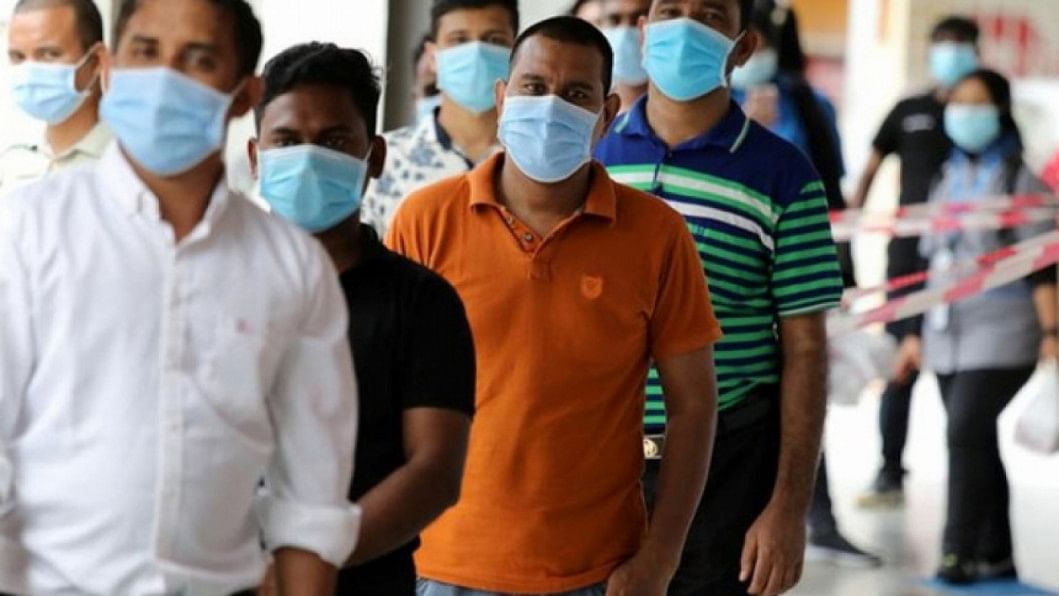Left to fend for themselves

"I put in more than 10 years of service and believed that my company was my world. I have never been sick before. In 2015 when I fell ill and was hospitalised, my employer refused to cover the costs. My work associates pooled resources for my treatment and family had to sell land to pay for my hospital bills. I never thought my employer would do this to me." – Atiq Mia, 34, Tangail, worked in a southeast-Asian country.
"We didn't have health cards and thus could not go to the hospital when we fell sick. We simply took medicines that some of us had carried along from home, hoping we would get well."– Masum Billah, 31, Cumilla, worked in a Gulf state.
"There were restrictions on how much water we could use."– Mamun Sheikh, 28, worked in a Gulf state.
The above statements of three returnee migrant workers capture and convey the stark insecurity of the healthcare needs of migrant workers in the Gulf states and even elsewhere. The health vulnerability of this cohort of workers has thus far received scant attention in policy discourses of the countries of origin (CoO) and destination (CoD).
While the origin states' primary focus remains national security and the workers' immigration and employment status, it is the workers' remittance flow that dominates the policy agenda of the origin states with dissemination of information on safe and regular migration, skills development and remittance utilisation patterns gradually creeping up in the policy agenda. With their focus on none-the-lesser issues such as information dissemination, financial literacy, access to justice and the like, the non-governmental sector's engagement with migrants' health issues in the CoOs is also minimal and almost non-existent in the CoDs. Likewise, the matter is yet to gain traction in the celebrated regional and global processes such as the Global Forum on Migration Development, the Colombo Process, and the Abu Dhabi Dialogue.
The experiences of short-term migrant workers after the outbreak of the Covid-19 pandemic have clearly brought to light the precarious nature of healthcare structures that exist for this group of workers, who build and maintain the edifice of national economies for many host states. The pandemic also exposed that their access to healthcare remains severely restricted, even if it is acknowledged on paper.
As a necessary condition of their employment, short-term contract workers are subjected to a formal health check-up before they can secure their work visa. In most instances, they are required to undergo such tests at diagnostic centres that are approved by the embassy concerned. The young men and women can only fly abroad for work if they are assessed as being medically fit. However, instances are replete in which migrants are sent back home for failing the second health screening that is conducted after their arrival in the CoD. The question therefore arises: Should not the destination countries be liable for the consequence, as the primary test was done in facilities that they had authorised?
A pertinent question arises as to why a section of motivated young men and women, who had successfully passed medical tests in both CoOs and CoDs, would suffer from various ailments (that are not generally associated with their age group) and require medical services.
The answer perhaps lies in the long working hours, absence of rest periods during extended shifts, exposure to heat, unsafe work conditions, etc. Workplace accidents, inadequate health and safety measures, and lack of safety gear and training are also important contributing factors. Unhygienic living conditions, often in crammed dormitories, lead to infections. Ill and degrading treatment including physical, verbal, and sexual abuse, not being placed in promised jobs, non-payment or irregular payment of wages and other entitlements, and lack of access to any redress mechanism subject our workers to mental harm and are likely to a take toll on their physical wellbeing as well.

The health vulnerability of female domestic workers is particularly acute. Restrictions imposed on their movement make it difficult for them to secure medical services and products such as sanitary materials. Many suffer from a feeling of isolation. Lack of privacy exacerbates their feeling of insecurity. It is the migrants in irregular status who suffer the most. In addition to their limited financial capacity to pay for medical services, the fear of getting reported by the hospital authorities precludes them from securing such services from formal institutions even in life-threatening conditions.
In the ongoing Vital Signs-RMMRU study on migrant workers' access to healthcare services, it was found that: (a) Migrant workers have little knowledge about the availability and entitlement of healthcare services in destination countries; (b) Most migrant workers are not covered by insurance and thus are constrained when accessing healthcare services; (c) There is a palpable absence of employers taking responsibility if workers fall sick; (d) Absence of medical coverage may lead to situations in which migrant workers have to sell property at home to clear medical bills in the CoDs; (e) The missions have little capacity to ensure employers bear the responsibility of workers' health needs or render any form of support or advise in this regard; (g) There is a propensity of migrant workers to self-medicate by taking medicine they or their peers have brought along from home.
A recent RMMRU dialogue on the healthcare needs of migrant workers, the participants underscored that the CoOs should insist that the CoDs enter into bilateral agreements containing provisions for protection of migrant workers, including those on accessing healthcare. Such provisions should ensure that workers in the CoDs are employed in decent work (including eight-hour workdays with adequate rest, leisure, and a safe workplace) and living conditions (with hygienic facilities and access to adequate water). It should also stipulate that employers are responsible for meeting the healthcare needs of the migrant workers they employ and that the work contracts should include adequate (not only nominal) insurance coverage.
Provisions should be kept so that employers do not abuse the illness of workers as an excuse to terminate their contacts. The CoOs should also empower and strengthen the offices of labour wings for their missions to monitor compliance with these provisions. The missions should also actively ensure that companies that are at the top of the global supply chain engaging migrant workers are responsible for the actions of all, including that of labour supply companies.
One of the key challenges identified has been the pervasive nature of "free visa" that facilitates migrant workers' engagement in undefined, insecure, and exploitative employment relationships – without any entitlements, including that of healthcare coverage. It was felt that, while "free visas" shore up the flow of workers, they also account for many of the ills that beset workers in the destination countries. Such a situation calls for providing incentive and support to the registered recruiting agents to help them procure company visas for skill-based labour markets and ensure fair and ethical recruitment.
The issue of high charges that migrants are subjected to for their pre-departure health check-up at embassy-approved medical facilities also figured in the dialogue. Concerns were expressed about the quality of equipment used for such tests (that may partly explain the variation in test results at two ends) and the unethical practices of many of these centres in which results are tampered to overcharge the service recipients.
During the workers' pre-departure orientation and also in the countries of destination, migrants should be adequately briefed on having a balanced diet of nutritious food, adequate sleep, regular hydration, wearing safety gear while working in hazardous conditions, etc. The CoOs must consider setting up a separate fund and disbursement system to meet the needs of sick, abused, and traumatised migrant workers, who often return with health and mental conditions that demand immediate attention.
Many CoDs are currently pursuing reform agendas that will impact their migrant workforce. The abolition of the Kafala (sponsorship) system by some states has been a welcome development. While those states rightly celebrate their successes in addressing the healthcare needs of their nationals, it's time they pay due attention to large deficits that exist in the healthcare services for their migrant workforce. Such a move will not only portray them to be caring destination countries for migrant workers, but will also help meet their obligations and commitments under the ILO labour standards, the Sustainable Development Goals agenda, and the Global Compact for Migration.
The author acknowledges the insights drawn from the RMMRU organised Obhibashon Alochona on Labour Migrants' Health on August 8, 2022 that was attended by senior state functionaries, researchers, civil society activists, media representatives and medical practitioners.
Dr C R Abrar is an academic and human rights expert.

 For all latest news, follow The Daily Star's Google News channel.
For all latest news, follow The Daily Star's Google News channel. 







Comments